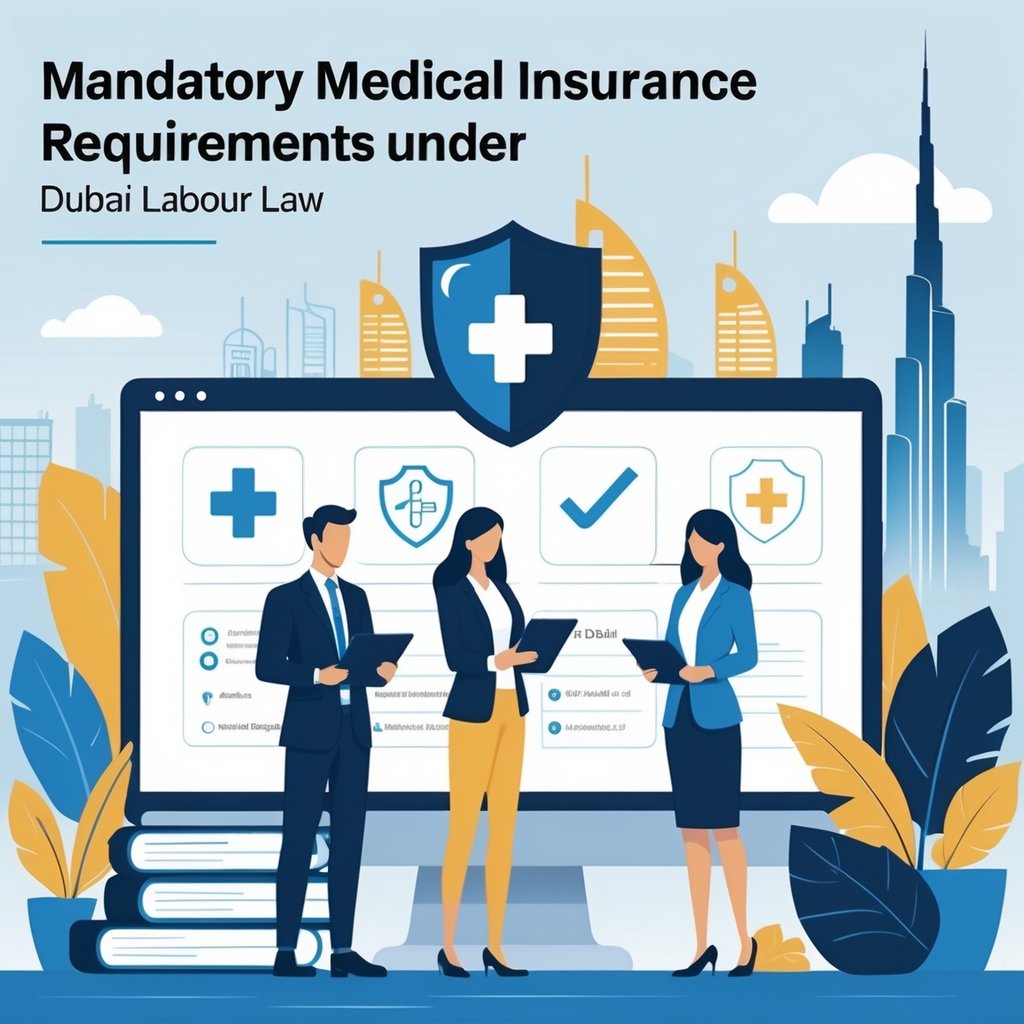Dubai’s labour law says every employer must provide medical insurance for employees. This rule has existed since 2014 and covers both UAE nationals and expats in the private sector.

All employers in Dubai must provide comprehensive health insurance for employees as mandated by Law No. 11 of 2013. Coverage extends to spouses and children under 18.
The Dubai health insurance law sets strict minimums for coverage and benefits. Employers have to meet these standards.
Business owners and employees really need to know these rules. The law spells out employer duties, employee rights, and penalties for skipping compliance.
Key Takeaways
- Dubai law makes health insurance mandatory for employees and their dependents
- Employers face heavy penalties for skipping or shortchanging medical insurance
- Employees have rights to emergency care, preventive services, and specialist treatments
Mandatory Medical Insurance Requirements in Dubai

Dubai enforces strict rules. Employers must provide medical insurance for workers.
The UAE Labour Law health insurance requirements became mandatory nationwide in 2025. This expanded Dubai’s system to all seven emirates.
Overview of UAE Labour Law on Health Insurance
The UAE government made health insurance mandatory for all private sector employees and domestic workers starting January 2025.
Employers have to give basic health insurance to every worker. This law protects both locals and expats.
Key requirements include:
- Coverage for all private sector employees
- Basic medical services
- Emergency treatment
- Maternity benefits for those eligible
The mandatory insurance scheme helps with healthcare costs. Employers who ignore it risk penalties and legal trouble.
Dubai Health Authority Regulations
The Dubai Health Authority (DHA) manages health insurance rules in Dubai. They’ve been running mandatory health insurance laws since 2014.
Your insurance plan must meet DHA standards. The authority sets the minimums for all plans.
DHA requirements cover:
- Inpatient hospital care
- Outpatient visits
- Emergency services
- Prescription drugs
- Lab tests and x-rays
The DHA checks insurance companies for compliance. They also handle worker complaints about insurance.
Eligible Beneficiaries
All employees in Dubai must have health insurance. This covers UAE nationals and expats with work visas.
Covered individuals:
- Primary: The employee
- Dependents: Spouse and kids under 18
- Domestic workers: Housemaids, drivers, similar staff
Employers must provide coverage within 30 days of start date. Insurance stays active as long as you’re employed.
Switching jobs? The new employer must pick up coverage, so you shouldn’t lose protection.
Approved Insurance Companies
Only licensed insurers can sell health plans in Dubai. The DHA keeps a list of approved companies.
Major approved insurers:
- Daman Health Insurance
- Dubai Insurance Company
- Oman Insurance Company
- ADNIC
- MetLife Alico
Employers pick the insurer. Employees can’t choose, but the plan has to meet DHA minimums.
All approved companies must offer the basic package. Some employers add extra benefits to attract talent.
Employer Obligations and Responsibilities

Dubai labour law puts legal duties on employers to provide health insurance. Private sector employers must pay for health insurance from the time they issue or renew a residency permit.
Sponsoring Employee Health Insurance
Employers have to provide health insurance for every employee under their sponsorship. Employers are legally responsible for medical coverage under Federal Decree-Law No. 33 of 2021.
The DHA requires employers to buy insurance that meets minimum standards. These policies include:
- Outpatient consultations
- Emergency services
- Surgeries and hospital stays
- Prescription meds
- Maternity care
- Diagnostic tests
Employers can’t pass the insurance cost to workers. The sponsor pays for coverage.
Non-compliance can mean AED 500 per employee per month in penalties if insurance is missing.
Requirements for Dependents and Family Members
Dubai focuses mainly on employee coverage. Employers must cover the sponsored employee.
Dependents like spouses and kids are usually the employee’s responsibility. Some employers offer family coverage as a perk.
If you add dependent coverage, it must meet the same minimums as employee policies. Many companies use this to attract skilled staff.
MOHRE doesn’t require dependent coverage in Dubai. Abu Dhabi does, but Dubai leaves it up to employers.
Compliance With Residency Permit Issuance
No valid health insurance means no residency permit. Health insurance is tied to visa and residency applications.
Dubai authorities check insurance records during visa processing. Skipping insurance during applications is nearly impossible.
Employers must provide insurance details during the permit process. DHA verifies coverage before permits get approved.
Key requirements:
- Valid policy number
- Coverage dates
- Insurer license verification
- Employee ID details
Renewal and Termination Implications
Employers must keep health insurance active the whole time someone works for them. No lapses allowed between renewals or job changes.
If an employee leaves, coverage must continue until the residency permit expires or a new sponsor takes over. Businesses must ensure continuous coverage throughout an employee’s tenure.
Renewal tasks:
- Set reminders
- Pay before policies expire
- Update employee info
- Keep documents
If you terminate someone, you still have to cover them until they leave the UAE or get a new job. This protects workers during transitions.
MOHRE requires detailed records of all insurance transactions and renewals for audits.
Employee Rights and Protections

Dubai law shields employees from unfair insurance practices and guarantees proper healthcare coverage. You have legal protection against salary deductions and clear ways to act if your employer skips required coverage.
Non-Deduction of Salary for Medical Insurance
Employers can’t deduct your salary to pay for required medical insurance. UAE law says they must cover the full cost of employee health insurance.
Protected Deductions:
- Basic insurance premiums
- Admin fees for processing
- Upgrade costs, unless you ask for premium plans
Check your pay slips often. Any deduction for medical insurance breaks Dubai labour law.
If your employer tries to cut your pay for insurance, that’s illegal. MOHRE treats this as a violation.
Your contract should state that insurance is free for you. Keep copies of documents mentioning insurance.
Recourse for Lack of Provided Coverage
If your employer fails to provide insurance, you have options. Start by asking for written proof of coverage.
Immediate Actions:
- Request your insurance card and policy info
- Document all talks with your employer
- Contact MOHRE if your employer refuses coverage
MOHRE handles complaints about missing insurance. File complaints online or visit their office.
Employers who skip insurance face fines and possible license suspension.
Labour consultants who know UAE employment law can help you file complaints.
Legal Action and Complaints Against Employers
You can take legal action if your employer ignores insurance rules. Dubai courts handle these cases.
Legal Options:
- File a complaint with MOHRE
- Go to labour court
- Seek compensation for medical expenses
Keep all records about your insurance issue. Save emails, texts, and any written proof.
You can claim compensation for medical bills you paid because of missing coverage. Courts often order employers to reimburse these costs plus penalties.
Labour lawyers can explain your rights under UAE law. Many offer free consultations for insurance cases.
Legal cases usually take three to six months. You can keep working while your case runs unless you feel unsafe.
Scope and Details of Health Insurance Coverage

Dubai’s health insurance laws require comprehensive coverage with set minimums for inpatient care, outpatient visits, and meds. All residents get coverage for chronic conditions from day one, with clear cost-sharing limits.
Core Health Benefits Under Dubai Law
Your insurance must include certain minimum benefits. Inpatient care needs 80 percent coverage, with your payment capped at AED 500 per visit and AED 1,000 a year.
Outpatient services come with a 25 percent co-pay, but your cost can’t go over AED 100 per visit. Follow-ups within seven days are free.
Medication coverage gives you up to 70 percent reimbursement. You won’t pay more than AED 1,500 a year for prescriptions.
Emergency services are fully covered, no matter your insurance status. Employers are legally on the hook if gaps exist during emergencies.
The law sets a minimum annual coverage of AED 150,000 per person. That should be enough for serious treatments and big procedures.
Basic vs. Premium Health Insurance Policies
Basic policies in Dubai meet mandatory health insurance requirements and cover only essential medical needs. These plans usually restrict you to certain providers and come with standard co-payments.
Premium policies go beyond the basics. You get access to more healthcare providers, lower co-pays, and extra perks like dental or optical coverage.
Cost differences can be pretty wide between these options:
| Policy Type | Annual Cost | Provider Network | Additional Benefits |
|---|---|---|---|
| Basic | AED 800-1,500 | Limited network | Essential coverage only |
| Premium | AED 2,500-8,000 | Extensive network | Dental, optical, wellness |
Employers must pay your insurance premiums. If they try to deduct costs from your salary, that’s against UAE labor laws.
Coverage for Chronic and Pre-existing Conditions
Dubai law requires insurance to cover chronic and pre-existing conditions right away. There’s no waiting period or exclusion.
Covered chronic conditions include diabetes, hypertension, heart disease, and cancer treatments. Insurers can’t reject claims or charge you more because of these.
Pre-existing condition protection means you get equal coverage when you enroll, no matter your medical history.
If you change jobs, your medical benefits don’t stop. New policies must continue your current treatment plans and medication.
Cost, Claims, and Policy Networks

Health insurance in Dubai starts at Dh 320 per year under the Essential Benefits Plan. Premium plans can cost several thousand dirhams.
The Dubai Health Authority approves providers and keeps claim procedures consistent across insurers.
Annual Premiums and Plan Pricing
Your insurance premium depends on your plan and the provider network size. The federal Essential Benefits Plan starts at Dh 320 per year.
Premium plans from private insurers cost Dh 800 to Dh 3,000 annually. These usually include bigger networks and lower co-pays.
Employers must pay all premiums. Salary deductions for insurance are illegal in the UAE.
| Plan Type | Annual Cost | Coverage Limit |
|---|---|---|
| Basic Federal | Dh 320 | Dh 150,000 |
| Standard Private | Dh 800-1,500 | Dh 150,000-300,000 |
| Premium Private | Dh 1,500-3,000 | Dh 500,000+ |
Healthcare Network and Providers
Your insurance connects you to approved hospitals, clinics, and pharmacies across Dubai. The basic network covers 7 hospitals, 47 clinics, and 44 pharmacies.
Premium plans get you into more facilities, including international hospitals and specialists. Most private insurers offer 50 to 100 network options.
The Dubai Health Authority lists all approved providers. You need to use network facilities for full benefits.
If you go outside the network, expect higher costs or no coverage at all. Double-check your provider accepts your insurance before you get treated.
Claim Process and Co-payments
Your plan sets co-pay amounts based on the service. Inpatient care usually comes with a 20% co-pay, max Dh 500 per visit.
Outpatient visits have a 25% co-pay, capped at Dh 100 per visit. Follow-up visits within a week are free.
Medication Coverage:
- Insurance pays 70%
- Annual max is Dh 1,500
- They prefer generic drugs
Claims process runs automatically at network clinics. You show your insurance card, pay the co-pay, and that’s it.
You need pre-authorization for surgeries and specialist care. The insurance company reviews and approves these before you go ahead.
Legal Compliance, Penalties, and Enforcement

Dubai takes medical insurance compliance seriously. Fines can hit AED 500 per employee each month, and your business might face restrictions if you slip up.
Consequences for Employers and Employees
Employer Penalties
If you don’t provide insurance, you risk hefty fines. Penalties reach AED 500 per employee per month without coverage in Dubai.
Fines go from AED 500 up to AED 150,000 for non-compliance. Repeat offenses in a year double the penalty.
Your business might get suspended until you fix things. The government can block new visa applications if you have unresolved violations.
Employee Protections
You have legal protections if your employer skips required coverage. Workers don’t pay litigation fees for claims under AED 100,000.
You can file complaints through official channels without worrying about costs. Your contract must include insurance details.
Regulatory Authorities and Oversight
Dubai Health Authority (DHA)
The DHA regulates medical insurance and checks employer compliance. They use digital tools and audits to monitor things.
You need DHA-approved insurance providers for your employees. The DHA e-portal lets you check coverage and manage compliance.
Ministry of Human Resources and Emiratisation (MOHRE)
MOHRE links health insurance to visas and work permits. Without the right insurance, your company can’t finish some government paperwork.
The ministry works with local health authorities to enforce rules. They inspect regularly to make sure workers have coverage.
Enforcement Mechanisms
| Authority | Enforcement Action | Penalty Range |
|---|---|---|
| DHA | Monthly fines, audits | AED 500+ per employee |
| MOHRE | Visa restrictions | Business suspension |
| Labour Inspection | Workplace checks | AED 200-400 base fines |
Special Cases: Visitors and Non-Residents
Visitor Insurance Requirements
Visitors must have valid insurance before entering Dubai. You can’t sponsor tourist visas without proof of coverage.
Short-term business visitors need temporary insurance that meets DHA standards. If you invite business guests, you’re responsible for their coverage.
Domestic Workers and Dependents
If you employ domestic workers, you must cover their medical insurance. This applies to housekeepers, drivers, and other staff.
Employee family members might need their own policies. Some employer plans cover dependents, others don’t.
Temporary Residents
Temporary workers still need full medical insurance. Contract length or job type doesn’t matter.
Non-compliance brings fines of AED 200 to AED 400 and possible visa issues for temporary staff. Anyone working in Dubai needs proper coverage, no exceptions.
Frequently Asked Questions

Employers in Dubai must provide medical insurance to all employees starting January 2025. The basic scheme costs AED 320 per year and covers essential medical services.
What are the requirements for employers to provide medical insurance to employees under Dubai labour law?
You must give medical insurance to all employees. Health insurance laws became fully mandatory in all emirates from January 1, 2025.
This applies to private sector and domestic worker employers. You’re responsible for health insurance costs when you issue or renew a residence permit.
Coverage kicks in as soon as work visas are issued. The government offers a basic insurance scheme at AED 320 per year for private sector workers.
How does the medical insurance provided by employers in Dubai handle pre-existing conditions?
The basic plan covers essential services, but pre-existing condition coverage depends on the policy you pick.
Read the policy details to see which pre-existing conditions are included. Most basic plans have waiting periods or exclusions for some conditions.
Talk to your insurance provider for specifics on pre-existing coverage. That way, you’ll know what gets covered for employees with existing health issues.
Does the mandatory medical insurance for workers in Dubai cover dependents, and what are the stipulations if it does?
Mandatory insurance covers employees only. You’re not legally required to cover dependents under the basic plan.
You can offer family coverage as a perk if you want. Many employers do this to attract and keep good staff.
If you add dependents, you’ll pay more in premiums. Coverage and costs for family members depend on the plan you choose.
What are the legal consequences for companies in Dubai that fail to provide adequate medical insurance to their employees?
You’ll face legal penalties if you skip mandatory insurance for your staff. UAE labor law demands full compliance with health insurance rules.
Penalties include fines and visa processing blocks. You can’t renew or issue residence permits without proper coverage.
Employees can also take legal action if you don’t provide insurance. This could mean more costs and headaches for your business.
Can employees choose their own medical insurance plans, or must they accept what their employer provides as per Dubai labour law?
Employees have to accept the insurance plan you provide. The law says it’s your job as employer to arrange coverage.
If employees want extra coverage, they can buy private insurance themselves. That gives them more benefits on top of your plan.
Your company plan must meet Dubai’s minimum requirements. Employees can’t opt out of your insurance, even if they have another policy.
What are the minimum coverage standards for medical insurance policies that employers need to adhere to in Dubai?
Your insurance plan needs to cover essential medical services. That means things like emergency care and basic treatments should be included.
The basic health insurance scheme offers coverage at AED 320 per year. Outpatient services, emergency treatment, and prescription medications all fall under the minimum coverage.
Plans also have to include basic diagnostic tests. Preventive care services must be part of it too.
Always check if your insurance provider has approval from Dubai health authorities. Coverage limits and specific benefits will vary depending on the plan you pick, but every plan has to meet the government’s minimum standards.












